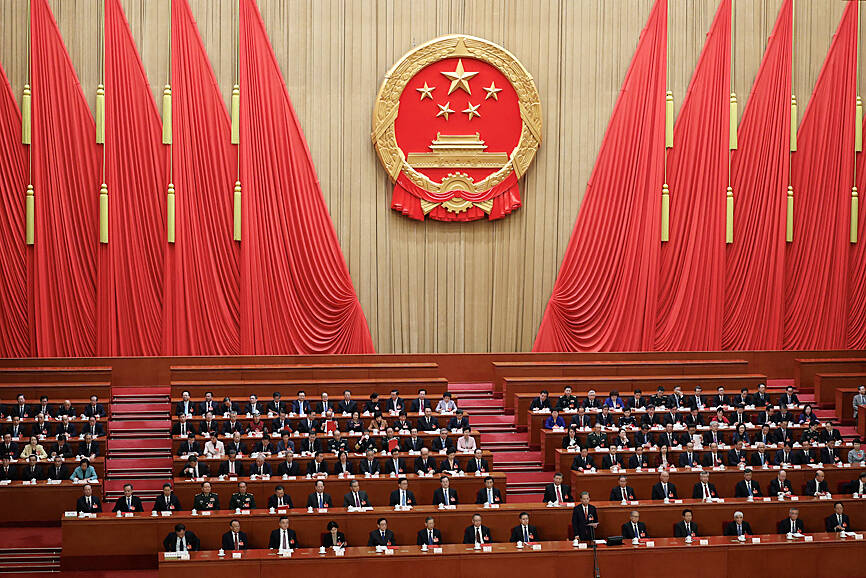China is likely to focus on its economy over the next four years and not set a timetable for attempting to annex Taiwan, a researcher at Beijing’s Tsinghua University wrote in an article published in Foreign Affairs magazine on Friday.
In the article titled “Why China isn’t scared of Trump: US-Chinese tensions may rise, but his isolationism will help Beijing,” Chinese international studies researcher Yan Xuetong (閻學通) wrote that the US and China are unlikely to go to war over Taiwan in the next four years under US president-elect Donald Trump.
While economic and military tensions between the US and China would likely heat up after Trump takes office next month, China’s main concern would be economic growth, he said.

Photo: Reuters
Trump might intensify his efforts to promote a broader decoupling from China and work to reduce the market share of Chinese products in the US, including products that are assembled outside China, and rely heavily on Chinese investment and components.
If that happens, Beijing might retaliate, sending the two countries into a tit-for-tat confrontation that could push the trade dispute to its peak, Yan wrote.
As a trade dispute heats up, the Trump administration would likely increase military pressure on Beijing, especially with US Senator Marco Rubio as secretary of state, and Pete Hegseth as secretary of defense, as both are staunchly anti-Beijing war hawks, he said.
If the US Senate approves their nominations, Trump might be encouraged to engage in bellicose remarks and impulsive actions in the South China Sea and the Taiwan Strait, potentially triggering a crisis similar to when then-US House of Representatives speaker Nancy Pelosi visited Taiwan in 2022, Yan said.
Her visit triggered unprecedented military drills around Taiwan.
On the other hand, Trump’s relative disinterest in ideological issues might soften some of the sharp confrontations between the US and China, Yan said, citing as examples Trump’s apparent lack of concern for human rights issues and disinterest in shaping China’s political system to match that of the US.
That would be in China’s interest, as the US would be unlikely to interfere in China’s internal affairs, enabling the Chinese Communist Party to focus on domestic political stability, he said, adding that the party has no intention of spreading its ideology globally.
Therefore, although economic and strategic conflicts between the two countries might increase, they would not likely escalate into ideological conflicts, Yan said.
While the issue of Taiwan’s sovereignty has always been a source of friction between the US and China, the two countries would be unlikely to go to war over this, he said, adding that Trump would also want to focus on US domestic issues, such as bolstering the US economy.
Competition between the US and China is focused on technological dominance, as national security and prosperity crucially rely on technological progress, Yan said.
The two countries would continue to compete with each other in fields such as artificial intelligence, and high-tech supply chains and markets, he said.

South Korean K-pop girl group Blackpink are to make Kaohsiung the first stop on their Asia tour when they perform at Kaohsiung National Stadium on Oct. 18 and 19, the event organizer said yesterday. The upcoming performances will also make Blackpink the first girl group ever to perform twice at the stadium. It will be the group’s third visit to Taiwan to stage a concert. The last time Blackpink held a concert in the city was in March 2023. Their first concert in Taiwan was on March 3, 2019, at NTSU Arena (Linkou Arena). The group’s 2022-2023 “Born Pink” tour set a

CPBL players, cheerleaders and officials pose at a news conference in Taipei yesterday announcing the upcoming All-Star Game. This year’s CPBL All-Star Weekend is to be held at the Taipei Dome on July 19 and 20.

The Taiwan High Court yesterday upheld a lower court’s decision that ruled in favor of former president Tsai Ing-wen (蔡英文) regarding the legitimacy of her doctoral degree. The issue surrounding Tsai’s academic credentials was raised by former political talk show host Dennis Peng (彭文正) in a Facebook post in June 2019, when Tsai was seeking re-election. Peng has repeatedly accused Tsai of never completing her doctoral dissertation to get a doctoral degree in law from the London School of Economics and Political Science (LSE) in 1984. He subsequently filed a declaratory action charging that

The Hualien Branch of the High Court today sentenced the main suspect in the 2021 fatal derailment of the Taroko Express to 12 years and six months in jail in the second trial of the suspect for his role in Taiwan’s deadliest train crash. Lee Yi-hsiang (李義祥), the driver of a crane truck that fell onto the tracks and which the the Taiwan Railways Administration's (TRA) train crashed into in an accident that killed 49 people and injured 200, was sentenced to seven years and 10 months in the first trial by the Hualien District Court in 2022. Hoa Van Hao, a